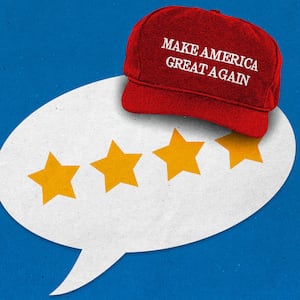Conservatives who are still trying to rationalize their support for Donald Trump have a shiny new metaphor to use: Trump is John Wayne.
Or maybe he’s Alan Ladd. The details don’t matter. He’s a cowboy, and on a steel horse he rides. At least, that’s probably the most persuasive insight presented in Victor Davis Hanson’s new book, The Case for Trump.
In making his case, Hanson, a senior fellow in military history at the Hoover Institution at Stanford University, invokes classics of the American film canon such as The Searchers, High Noon, and The Magnificent Seven, to explain Trump’s raison d'être.
ADVERTISEMENT
In case you haven’t seen Shane or The Man Who Shot Liberty Valance, these films generally adhere to a similar formula: Outlaw gangs or angry natives prey on inept lawmen, damsels in distress (rape is often implied), and soft and “civilized” easterners who are too wedded to their religious faith or legal books (think Jimmy Stewart in The Man Who Shot Liberty Valance) to pick up a gun.
Oh yeah, and then there’s the tragic hero who rides into town and saves the day.
The parallel to modern politics is pretty clear. Most politicians are too soft, civilized, or sanctimonious—too committed to playing by the Marquess of Queensberry Rules—to defend our modern frontier from Iran, North Korea, illegal immigrants, and knee-taking NFL players.
Enter Donald Trump.
This might seem like an awfully convenient theory to float, but, as Hanson notes (listen to our full conversation here), the tragic hero figure featured in these Westerns represents an archetype. “It’s innate to human experience that, at certain times, complex societies, at any point, feel—whether it’s accurate or not doesn’t really matter—they feel that traditional remedies haven’t worked, and so, they… bring in somebody to solve the problem.”
Here’s where things take a turn, and where Hanson arouses a bit of sympathy for Trump. The uncouth gunslinger’s job is a thankless one. Once the smoke has cleared and the villains are gone, people inevitably begin to resent him for what he says about them. For this reason, Hanson predicts that—once Trump does our dirty work—we will discard him. “There’s nothing in literature—there’s nothing in history—that suggests such an outsider wins commensurate praise or thanks for his contribution,” Hanson tells me.
The Western genre is only one of the examples Hanson draws upon in his book. He also cites real-life figures like World War II generals George Patton and Curtis LeMay. Hanson tells me, “If George Patton had not been in charge of the 3rd Army… we would never have gotten to the Rhine when we did; there would have been 30 or 40 thousand additional deaths.” He also notes that tragic heroes have been portrayed in Homer’s Iliad and Sophocles’ plays. These figures, Hanson writes, “… are not intrinsically noble. Much less are they likable. They can often be obnoxious and petty, if not dangerous, especially to those around them.” Sound familiar?
But I’m more interested in the concept of Trump-as-John Wayne, inasmuch as it’s safe to say that more of Trump’s fans are consciously aware of the themes of cowboy archetypes than they are, say, with Ajax or Antigone. When you start to read about this trope, you discover that Westerns present a paradox that says, “Civilization can only be defended from barbarians by men with guns, but once you pick up a gun, you are a barbarian.” Or as Nietzsche warned, “He who fights monsters should see to it that he himself does not become a monster.” The danger being that accepting Hanson’s premise means monstrous behavior can be excused as a necessary evil.
So is this a thought-provoking theory from a military historian, or just a lame attempt by an apologist to retroactively graft some mythology onto Trump’s vulgarian presidency?
Hanson’s point—that “at certain times” people “feel” they need to bring in a gunslinger—is, I suspect, true. It might not justify Trump’s election, but it does, at least, help explain it.
In my mind, the notion of Trump as a temporary fixer is fanciful. What is he fixing exactly? When he rides off into the sunset, will he leave behind a thriving society, or one with massive scars and eroded norms? Maybe both.
Many Americans see this drama exactly as Hanson has described it. For them, the lesson is clear: We are lucky to have Donald J. Trump. He’s the only John Wayne left in this town, and we had better accept him for who he is—warts and all.






